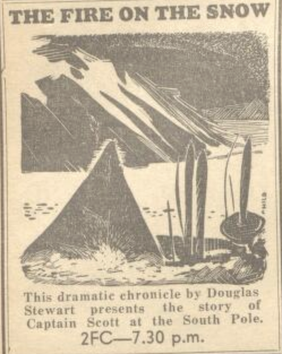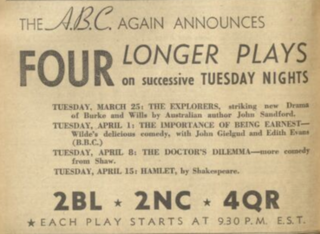
The Special Broadcasting Service (SBS) is an Australian hybrid-funded public service broadcaster. About 80 percent of funding for the company is derived from the Australian Government. SBS operates six TV channels and seven radio networks.
The Australian Communications and Media Authority (ACMA) is an Australian government statutory authority within the Communications portfolio. ACMA was formed on 1 July 2005 with the merger of the Australian Broadcasting Authority and the Australian Communications Authority.
The Department of Communications, Information Technology and the Arts (DCITA) was an Australian government department that existed between October 1998 and December 2007. The Department was closed on 3 December 2007 and its authority was transferred to the Department of Broadband, Communications and the Digital Economy.
The Australian Broadcasting Control Board was an Australian government agency formed in 1949 whose main roles were to regulate commercial radio and television broadcasting. It was also the introducer and regulator for FM broadcasting.
Myuna Colliery is a coal mine at Wangi Wangi, New South Wales, Australia. The colliery was developed to provide coal for the Eraring Power Station, 5 kilometres to the west. The mine started in August 1979, with coal production commencing in 1982. The Wallarah, Great Northern and Fassifern coal seams have been mined using bord and pillar mining methods. Coal is transported to the Eraring Power Station by an overland conveyor system.
A Romance of Burke and Wills Expedition of 1860 is a 1918 Australian silent film. The plot is fictional and is loosely based around the Burke and Wills expedition.

The Fire on the Snow is a 1941 Australian verse play by Douglas Stewart about the Terra Nova Expedition to Antarctica by Robert Falcon Scott. It premiered on ABC radio on 6 June 1941 to great acclaim.
The Australian Film Development Corporation was an organisation created and funded by the Australian Government in the 1970s, intended to allow filmmakers in the Australian film industry to create movies for everyone to see. In 1975 it was replaced with Australian Film Commission.
Serpent in the Rainbow is an Australian mini series which first screened on the ABC in 1973. It was set in the late 19th century.

The Broadcasting Services Act 1992(Cth) is an Act of the Parliament of Australia, which broadly covers issues relating to content regulation and media ownership in Australia. The law stipulates what is political advertising and the specific conditions which must be met before they are authorised for publication.
The Man Who Shot the Albatross is a play by Ray Lawler about the Rum Rebellion, first performed in 1971. A 1972 television film featured the stage cast.
Over There is an Australian television drama adventure series which first screened on the ABC in 1972 to 1973.
The history of broadcasting in Australia has been shaped for over a century by the problem of communication across long distances, coupled with a strong base in a wealthy society with a deep taste for aural communications in a silent landscape. Australia developed its own system, through its own engineers, manufacturers, retailers, newspapers, entertainment services, and news agencies. The government set up the first radio system, and business interests marginalized the hobbyists and amateurs. The Labor Party was especially interested in radio because it allowed them to bypass the newspapers, which were mostly controlled by the opposition. Both parties agreed on the need for a national system, and in 1932 set up the Australian Broadcasting Commission, as a government agency that was largely separate from political interference.

Risdon Zinc Works is a major zinc refinery located in Lutana, a suburb of Hobart, Tasmania, Australia. The smelter is one of the world’s largest in terms of production volume, producing over 280,000 tonnes annually of high-grade zinc, primarily as die-cast alloys and continuous galvanising-grade alloys. These products are exported for global markets and utilised in a wide range of industries and products, from building and infrastructure to transportation, business equipment, communications, electronics, and consumer goods. The facility produces zinc using the Roast, Leach, Electrowinning (RLE) method, creating leach byproducts, including cadmium, gypsum, copper sulphate, lead sulphate, sulphuric acid, paragoethite and leach concentrate. The refinery has been owned and operated by the global multi-metals business Nyrstar since 2007. Nyrstar Hobart works closely with the Nyrstar Port Pirie multi-metals smelter in South Australia. The facility is Tasmania's largest exporter, contributing 25% of the state's overall export value in 2013.
Jutta Feddersen was a German-born Australian fibre artist, sculptor, lecturer.
The Resistible Rise of Arturo Ui is a 1972 Australian television play based on the stage play by Bertolt Brecht.
Stranger Come In is a 1951 Australian radio drama by Max Afford. It was unusual for Afford in that it dealt with contemporary social problems.
The Sundowner is an Australian radio series starring Chips Rafferty as a swagman.
Chips is a 1952 Australian radio drama series starring Chips Rafferty. It is not to be confused with his earlier series The Sundowner although it too was an outback adventure series.

The Explorers is a 1952 Australian radio play about the Burke and Wills expedition by John Sandford. It was Sandford's first play.





